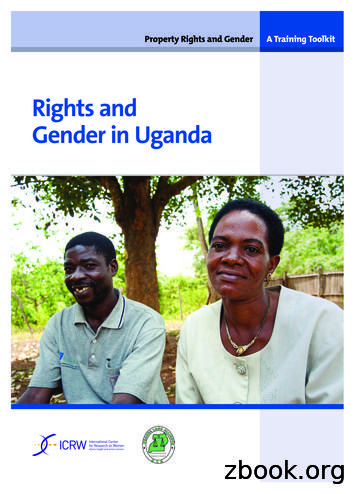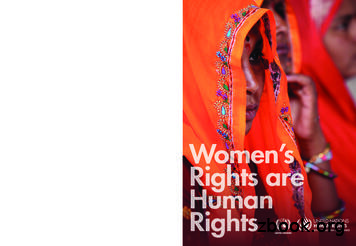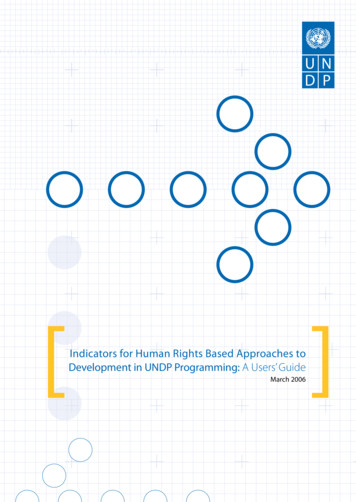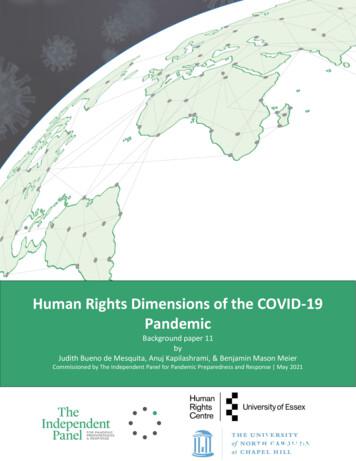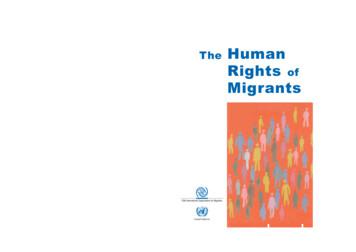OUR COMMITMENT TO HUMAN RIGHTS - Hilton
HILTON SLAVERY ANDHUMAN TRAFFICKINGStatementFINANCIALYEAR 2019This statement is published by Hilton, in compliance with the UK Modern Slavery Act 2015. It details the steps taken by Hilton toidentify and take steps to prevent modern slavery and human trafficking in all parts of its business and supply chains across its globaloperations during the Financial Year 2019. Hilton manages, leases and franchises hotels, provides hospitality services, and carries onbusiness in the United Kingdom largely through Hilton Worldwide Manage Limited and Hilton Worldwide Limited, as well as AddaHotels, HLT Stakis Operator Limited, Hilton Worldwide Holding LLP, Hilton International IP Holding Limited and Hilton InternationalHotels (UK) Limited. For the purposes of this statement, the companies carrying on business within the United Kingdom, includingthe entities mentioned above, are collectively referred to as “Hilton.”OUR COMMITMENT TO HUMAN RIGHTSAt Hilton, we have a shared purpose to be the most hospitable company in the world by positively impactingour guests, Team Members*, hotel owners and communities. As a business of people serving people,respecting human rights is a core part of our mission. Hilton is committed to implementing human rightsdue diligence across our global operations, to work with suppliers to eradicate any form of forced labor andhuman trafficking, and to create and partner with cross-industry networks to advance international humanrights as part of our 2030 Travel with Purpose Goals. Hilton is a proud signatory of the United Nations GlobalCompact, and its human rights strategy is informed by the United Nations Guiding Principles for Businessand Human Rights (UNGPs).OUR BUSINESS STRUCTUREAND SUPPLY CHAINHilton is a global hospitality company with aportfolio of 18 brands comprising more than 6,100properties with more than 970,000 rooms in 119countries and territories, supported by more than424,800 Team Members*.Under management agreements, we use our marksand systems to operate hotels. The 173,500 peopleemployed at our managed properties, leased hotels,and our corporate offices (including Hilton SupplyManagement – “HSM”) are referred to as “HiltonEmployees”.Through franchise agreements, we license ourmarks and systems, which help the franchiseesucceed in its business. Franchised propertiesmake independent decisions regarding their hoteloperations, including procurement, employmentand training practices. The people who areemployed by the owners (or its designees) offranchised properties are referred to as “FranchiseBelow is a chart showing the number andpercentage of Hilton hotels as of (12/31/2019):Employees.” There are approximately 251,300Franchise Employees who work on-property atindependently owned and operated franchiseproperties in the Hilton portfolio.HSM is the global procurement and supply chainarm of Hilton. HSM supports more than 10,000hotels across the world, approximately 9 percentof which are Hilton-leased or managed properties,50 percent are franchises and 41 percent areindependent businesses unaffiliated with Hilton.HSM develops and negotiates product and servicesupply programs with more than 1,200 directsuppliers and over 150,000 suppliers across oursystems that make available goods and services atthe best combination of price, quality, and service.While we strongly encourage our hotel ownersacross our global portfolio to use HSM services, notall hotel owners choose to participate. In addition,hotel owners are responsible for establishing theirown supply chain during the development stage ofhotels, including construction.A more detailed description of our business modelcan be found in our public filings.Leased/Owned/Joined VentureOperating HotelsShare of Total Operating al6,110100%
OUR HUMAN RIGHTS POLICIES ANDGOVERNANCEOUR DUE DILIGENCE PROCESSES - RISKIDENTIFICATIONOur commitment to respecting human rights isenshrined in our Code of Conduct, Human RightsPrinciples, and Responsible Sourcing Policy,including the prohibition of forced labour, bondedlabour, child labour, slave labour, human traffickingand recruitment fees, and the prohibition for anyHilton property, product, or service from being usedin any manner that supports or enables any formof abuse and exploitation. Those three documentsapply to Hilton Employees at our leased andmanaged hotels, and our corporate offices and arereviewed periodically.In 2015, we completed a global human rights impactassessment across our business activities, includingmanaged and franchised hotels, corporate officesand business relationships. This assessmentfocused on the risk our business operations maypose to individuals’ rights in terms of severityand likelihood, based on external research andexperience. Our assessment identified thefollowing salient modern slavery risks:These documents are also made available to ourfranchisees and our business partners to educatethem on Hilton’s business principles, and toencourage them to develop similar policies andprocedures for their own operations and to sharethose policies and procedures with their respectivebusiness partners. The Responsible Sourcing Policyis attached to all new contracts with suppliers andpart of the contractual expectations, while theHuman Rights Principles are shared with all newowners and referred to as part of the new countrydevelopment mitigation plan brand standard.Additionally, all our human rights-related trainings,guidance, tools and network of partners areavailable to franchises. We encourage them toleverage these resources through regular internalcommunications. We review these policiesperiodically.Human Rights is managed by Hilton’s CorporateResponsibility team, in collaboration with the LegalCompliance Department. Hilton’s Human Rightsstrategy is reviewed by an internal working group,which brings together representatives of keysupport functions, and is approved by the ExecutiveCommittee representatives for Corporate Affairsand Legal. The responsibility for human rightsultimately sits with the Global Head of CorporateAffairs, who sits on the Executive Committee. Ourcorporate responsibility priorities, including humanrights risks, strategy, policies, are reviewed by theBoard annually.1. Operations: Hotel Team Members may be insituations of forced or bonded labour. Hotelsmay be used by criminals to traffic victims forsexual exploitation.2. Supply chain: Individuals employed by Hiltonhotels via a recruitment agency or a labouroutsourcing agency, or by other goods orservices suppliers may be in a situation offorced / bonded or child labour as a result ofa range of potential factors, from excessiverecruitment fees to inappropriate monitoringof workers’ ages.3. Development phase: Construction workersemployed by owner-appointed contractorsmay pose situations of forced / bonded orchild labour as a result of a range of potentialfactors, from excessive recruitment fees, torestrictions on freedom of movement or failureto monitor workers’ ages.We identified potential higher vulnerability forcertain groups across these areas, includingchildren, women and migrant workers.That same year, we also conducted a mappingexercise of our global supply chain across arange of economic, environmental, and socialrisks, including human rights, based on externalindicators and spend. We refreshed the analysisin 2019, focusing on modern slavery issues, andidentified the following categories for additionalattention: meat, seafood, produce, garments andtextile, and services.We mapped all of our operating hotels and pipelinecountries against 11 external human rights riskindices in both operations and supply chain, eachupdated annually. For example, the Modern SlaveryIndex assesses the risk to business in any industryof the possible association with or exposureto practices of slavery, servitude, trafficking in
persons and forced labour by state and non-stateactors within its supply chain, as defined by VeriskMaplecroft. Based on this analysis, we estimate 11percent of Hilton-branded hotels are located incountries with higher risks of modern slavery in thesupply chain (6 percent of those are managed and5 percent are franchised). This analysis informs theprioritization of our work, including the deploymentof tools and processes at managed hotels, andefforts to make such tools available for franchisebusiness partners.We supplement these mapping exercises based onindices with data collected via our internal GlobalEnterprise Risk Survey, which is distributed to morethan 270 Hilton leaders, and includes human rightsand modern slavery issues. The Global Intelligenceteam uses a social media-monitoring platform thatidentifies possible human trafficking situationsbased on keyword scraping and commercial ads.In 2018 we launched our country due diligenceprocess, including human rights risk analysis.This dynamic risk identification and continuousmonitoring process helps inform our human rightsstrategy, and the prioritization of countries andissues for more detailed risk assessment, duediligence, and training across operations, supplychain, and hotel development.OUR DUE DILIGENCE PROCESSES – RISKMONITORING AND MITIGATIONOur mitigation response to identified risks dependson Hilton’s direct link to the situation and theleverage the company may have in each context.1. MonitoringWe encourage Hilton Team Members to raiseconcerns about potential violations of our Codeof Conduct, including risks of human trafficking ormodern slavery, via the Hilton Hotline. The Hotlineis an anonymous reporting mechanism available foranyone to report concerns regarding our corporateoffices, or leased and managed properties.The Hilton Hotline is also available externallyto suppliers, business partners, consumers andcommunity members. For managed hotels, Hiltondirectly reviews and investigates Hotline reports,and tracks findings and responsive actions. Forfranchised hotels, Hilton ensures allegations areformally communicated to the relevant franchiseowner with reminders of the franchise owner’scontract obligations, the brand standards and thelaw. Hilton’s Global Ethics and Compliance teamis responsible for ensuring all Hotline reportsreceive appropriate review and response. On aquarterly basis, the Global Ethics and Complianceteam provides confirmation to Hilton’s Board ofDirectors and external auditors that all Hotlinereports have received appropriate treatment. TheGlobal Ethics and Compliance team also engagesin benchmarking to ensure the Hilton mechanism isfunctioning effectively in terms of expected volumeof reports.2. OperationsAll Team Members are required to report safetyor reputational incident, including potentialsituations of modern slavery, via an incidentalert mobile application. Alerts are managed andtriaged by the corporate safety & security teamand the emergency operations centre, involving allnecessary stakeholders to respond appropriately.Identified trends inform the strategy for in-persontraining roll-out.In addition to this broad direction, Hilton had alsodriven specific measures on a number of criticalpoints, including:Human Trafficking: All hotel-based Team Membersare required to complete training on how to identifyand report signs of human trafficking (see relevantsections below). The process is managed by theCorporate Responsibility and Human Resourcesteams globally, and by the Safety and Securitydepartment on property. A list of signs to identifyrisks of human trafficking for sexual exploitationand forced labour is posted in Team Member areasat all managed hotels globally. In the U.S., we rolledout posters to raise awareness of the U.S. NationalAnti-Trafficking Hotline in guest-facing areas of ourmanaged hotels, in line with a number of state laws,and we shared available resources with franchisedhotels.Orphanage Tourism: We recognize “orphanagetourism” may take place in certain countries wherewe operate. We regularly remind all hotels notto offer or promote any tour that would includeorphanages.Safe And Ethical Recruitment: We understandsome unscrupulous organizations may use theHilton name to fraudulently recruit individuals andmake a point to warn against recruitment fraud on
our career site. We do not charge recruitment feesand expect our business partners to do the same.Wherever possible, Hilton hires candidates directly.When the candidate needs to relocate, Hiltonissues recruitment contracts directly to thembefore departure. In the Middle East and Africa,Hilton also covers travel expenses for employeesarriving to assigned work locations from overseas.3. Supply ChainOur Responsible Sourcing Policy outlines thestandards expected of Hilton suppliers. Suppliersare encouraged to have appropriate managementsystems in place and take steps to comply withthis policy. Based on the amount of spend andidentified regional risks, we require our topsuppliers to acknowledge our Responsible SourcingPolicy and to undergo a deeper due diligence. Theprocess is managed by the Procurement and LegalCompliance departments.We rolled out a labour sourcing managementprocess for our leased and managed hotelsin Europe, Middle East and Africa (EMEA). Alloutsourcing and recruitment agencies arecontractually required to live up to the standardslaid out in our Responsible Sourcing Policy andHuman Rights Principles, including the prohibitionof recruitment fees. They must undergo duediligence and compliance checks, including initialscreening on human rights, before the agenciesare placed on a regional list of preferred suppliers.We will expand this process to other regions goingforward.Recruitment agencies: As part of our continuousprocess improvement efforts, in 2019, weconducted a deep dive in ethical recruitment inthe Middle East for our managed hotels whereemployees are primarily hired through recruitmentagencies. We enhanced our recruitment manualand processes, from recruitment agencymanagement to candidate interviews, inductionand welcome to align with our commitment toethical recruitment. Where hired employees mayhave paid recruitment fees, we investigate theclaims internally. If substantiated, we require theagencies to reimburse the individuals within aset timeframe and remove the agency from thepreferred supplier list.Outsourcing agencies: We are rolling outcontractual requirements for outsourcing agenciesin managed hotels in EMEA to conduct third-partyaudits that cover all aspects of worker welfare, fromrecruitment to employment conditions. To supportthis requirement, we created training and resourcesfor our hotels and labour providers on the risk ofmodern slavery in labour sourcing. We continuedto roll out the training and the auditing programin 2019. We also strengthened the due diligenceconducted by our South East Asia regionalHSM and Safety & Security teams on securitycontractors, including review of potential indicatorsof modern slavery.In 2019, we integrated human rights criteria aspart of our global textile request for proposal. Weare looking to consolidate our due diligence andmonitoring process across identified higher-riskcategories. Where potential situations of forcedlabour are identified, we investigate the issue anddevelop mitigation plans with the supplier.4. Development and ConstructionWe carry out due diligence review on our hotelowners, including a human rights reputationalreview and the transmission of our Code ofConduct and Human Rights Principles to allpotential owners.Prior to agreeing to develop a hotel in a newcountry, we conduct country-level due diligence,which includes a review of human rights in theregion. The process is overseen by our LegalCompliance department and includes review bythe Executive Compliance Committee, made ofrepresentatives from the Executive Committee.We created risk-based country-level mitigationplans for more than 100 countries to date. Thesemitigation plans are implemented through a brandstandard applicable to all new Hilton-branded hotelin that country, whether managed or franchised.To support owners and business partners withcomplying with these brand standards, wedeveloped a suite of tools they can use to identifyand manage human rights risks in operations andsupply chains.
TRAINING AND AWARENESSWe signed the ECPAT Code to combat sexualexploitation in the travel industry in 2011 and havebeen providing training on human trafficking risksto all our hotels ever since. In 2019, we continued toroll out the mandatory training requirement for allhotels globally as part of our annual Brand Training.Our annual Code of Conduct training includes asection on human rights and is mandatory to allHilton Team Members. Across both trainings, wetrained 4,718 General Managers by the end of 2019.Another 124,500 Team Members across 5,763hotels have taken the online training since 2017.In addition to this, other notable training momentsincluded:Human Trafficking Training around Major Events:Our safety and security teams and outside partnersroutinely train hotel Team Members in person onidentifying and combatting human trafficking ona risk basis. For example, at the occasion of theSuper Bowl in Atlanta, Georgia, in January 2019, wepartnered with the NGO It’s a Penalty to increaseawareness with Team Members, guests and otherparticipants about signs of human trafficking andhow to report it across all hotels (managed andfranchised) in greater Atlanta. All managed hotels inCairo went through in-person training ahead of theAfrican Cup of Nations 2019.Training for Safety and Security: Anti-humantrafficking experts also presented at Hilton’s 2019Global Annual Safety & Security Conference,reaching more than 180 Security Team Members.Labour Sourcing: We continued to roll out oure-Learning training on the key risks of modernslavery in labour sourcing. The training module isavailable to all Team Members, and mandatory forall Hilton Employees in EMEA who are key decisionmakers in recruitment and outsourcing decisions(i.e., General Managers, Human Resources,Procurement, Finance). By the end of 2019, 91percent of the assigned employees had taken thetraining. We developed guidance documents thatprovide additional help to hotels and agenciesconducting due diligence in labour sourcing. Thosedocuments are available to all hotels, includingfranchises.In 2019, our training on the risks of modern slaveryin labour sourcing became freely available to thewhole industry via to the International TourismPartnership (ITP). This will help accelerate theindustry’s ability to identify and mitigate those risks,in line with the ITP Forced Labour Principles (seesection below).Development: We make some training in antihuman trafficking and risks of modern slaverymandatory for owners to roll-out with theircontractors based on a country-risk analysisthrough our new country development process.
PERFORMANCE INDICATORS2030 Travel withPurpose GoalsKPIEmbed human rights in Hiltonpolicies and governanceProgress to DateHuman Right Principles details companyapproachCode of Conduct includes commitmentto respect human rights and to norecruitment feeResponsible Sourcing Policy includes humanrights100% hotels trained in antihuman trafficking by 2030,including all Hilton TeamMembersEmbed human rights duediligence across our globaloperationsSigns of Human Trafficking (since 2017): 5,763 hotels (94%) have one or more TeamMembers trained 4,717 General Managers (78%) 124,500 Team Members (e-learning only, notcounting in-person training)Modern Slavery in Labour Sourcing (since 2018): 4,053 Team Members 1,394 (91%) assigned labour sourcing leadersin EMEA (General Managers, HR Directors,Procurement Leads, Directors of Finance)100% operating hotels andpipeline countries mappedagainst human rights risksand information embedded inoperations and developmentprocessesMapped 100% operating hotels and pipelinecountries against 11 human rights risk indicesIntegrated Human Rights criteria in our annualinternal Global Enterprise Risk SurveyConducted more than 100 country-levelhuman rights reviews and developed actionplans accordinglyDeveloped human rights support material forowners on identified salient issuesEmbed human rights duediligence in our supply chainand partner with suppliers toeradicate any form of forcedlabour or trafficking100% suppliers have received theResponsible Sourcing PolicyPolicy embedded in any new contract with 1stTier suppliers100% Hilton Supply Management(HSM) Team Members trainedin risks of modern slavery in thesupply chain by 2030100% Hilton HSM Team Members have beentrained in responsible sourcing, includinghuman rights risks in the supply chain100% labour outsourcingagencies audited in Europe,Middle East and Africa by 203044 audits completed in Europe, Middle Eastand Africa100% Procurement leads in EMEA have takenthe training in risks of modern slavery inlabour sourcing
PERFORMANCE INDICATORS2030 Travel withPurpose GoalsKPISupport International TourismPartnership (ITP) Human RightsGoalsProgress to DateAligned internal Key Performance Indicatorsto ITP human rights goalsReferencing the ITP Forced Labour Principlesin human rights support material shared withbusiness partners (suppliers, owners)Made our training on risks of modern slaveryin labour sourcing freely available to the wholeindustry via the (refers to ITP Forced LabourPrinciples), enabling 14 organizations acrossthe broad industry to complete the trainingOther partnersCreate and partner withcross-industry networksto advance internationalhuman rightsReconvened 24 past fellows of the VitalVoices Global Freedom Exchange programmefrom 11 countries on the African continentin South Africa for continuous capacitybuilding and regional collaboration forgrassroots solutions to prevent traffickingand rehabilitate survivorsPartnered with It’s a Penalty campaign toraise further awareness with Team Members,guests and other participants to the SuperBowl across our 40 hotels in Atlanta,Georgia, USACo-founded the World Travel and TourismCouncil Anti-Trafficking Task ForceSupported foundational collaboration with theUK Gangmasters and Labour Abuse Authority,in partnership with the UK Stop SlaveryNetwork Framework
PARTNERSHIPS AND ENGAGEMENTHuman rights risks in the travel and tourismindustry are complex, and we recognise wecannot solve them on our own. Accordingly, weare proactively engaging with industry and expertorganisations to better identify challenges, developsolutions and accelerate impact.Since 2011, we have been signatories of the ECPATCode of Conduct to fight the sexual exploitationof children in travel and tourism, and have beenproviding their training on identifying signs oftrafficking to all our hotels.In order to better combat risks of trafficking forsexual exploitation, we have partnered with VitalVoices since 2012. In 2013, we co-founded the GlobalFreedom Exchange (GFE) program to supportwomen leaders at the forefront of global efforts toprevent and respond to human trafficking. Sinceits launch, we have helped empower 126 antitrafficking women advocates from 50 countries.To further build capacity for the anti-traffickingleaders, Fellows have the opportunity to applyfor grants for their projects aiming to prevent,address and reduce human trafficking. Since2013, a total of USD 259,000 have been awardedto Fellow organizations in 20 countries. Thedifferent projects have impacted more than 7,260beneficiaries, including 830 public officials (training),4,630 community member (prevention), and 1,800trafficking survivors (rehabilitation).In November 2016, we co-founded the UK StopSlavery Hotel Industry Network, led by ShivaFoundation, which brings together hotel brands,operators and owners. We supported the draft andlaunch of the Framework to Engage with Suppliers,which provides tools to help procurement teamsengage suppliers to address risks of forced labourand modern slavery in the supply chain. We alsosupported the Network’s new Resource Hub. Bothresources are a first for the hotel industry.Our President and CEO, Chris Nassetta, is the Chairof the World Travel and Tourism Council (WTTC). In2018, we supported the launch of the ECPAT/WTTCCall for Action for the Protection of Children inTravel and Tourism, and in 2019 we co-founded theWTTC Anti-Trafficking Task Force.We are co-founders of the International TourismPartnership (ITP) and an active member of theirHuman Rights working group. Building on thelaunch of the ITP Human Rights Policy Statementand Human Rights Goals and Forced LabourPrinciples, we shared our internal training on risksof modern slavery in labour sourcing with the ITP. Itwas freely available to all ITP members throughout2019, and became publicly available to the wholeindustry at no cost in December 2019. Through theend of 2019, 14 organizations had already used thetraining, including hotels, industry associations,airlines, and NGOs.In 2019, Hilton proactively participated in a seriesof workshops for the hotel industry in Qatar on fairrecruitment organized by the ITP, the InternationalLabour Organization (ILO), the Qatar Ministry ofAdministrative Development, Labour and SocialAffairs (ADLSA) and the Institute for Human Rightsand Business (IHRB), sharing best practices andcontributing to the creation of industry-wide tools.We are members of the Global Business Initiativeon Human Rights, a coalition that works to advancehuman rights in a business context through crossindustry peer learning, outreach and capacitybuilding.In 2019 we started our collaboration with theorganization It’s a Penalty to leverage the SuperBowl in Atlanta, Georgia, U.S., to continue toraise awareness about human trafficking with allparticipants attending the game – Team Members,guests, local stakeholders, NGOs. We continuedour collaboration ahead of the 2020 Super Bowl inMiami, Florida.
OUR ONGOING COMMITMENTAs we track towards our 2030 Travel with Purpose Goals, we will focus on: Continuing to roll out our trainings; Expanding key due diligence programs in labour sourcing, in particular across Asia-Pacific; Strengthening risk identification and due diligence processes around goods supply chain due diligence; Developing training effectiveness measures; Rolling out mitigation plans in new countries; Continuing to collaborate with peers in the industry and beyond to address systemic and shared modernslavery issues; and Continuing to support civil society in their awareness-raising and grassroots missions to prevent humantrafficking and support victims.Simon VincentExecutive Vice President & President, Europe, Middle East & AfricaDirector of the Board for Hilton Worldwide Limited (UK)RELEVANT POLICIES AND RESOURCES:Statement for the UK Modern Slavery Act – FY 2016: ilton-MSA-statement-May-2017.pdfStatement for the UK Modern Slavery Act – FY 2017: http://ir.hilton.com/ position/2018-msa-statement-010518.pdfStatement for the UK Modern Slavery Act – FY 2018: https://ir.hilton.com/ position/hilton-msa-statement-2019.pdfCode of Conduct: http://ir.hilton.com/ mposition/hlt-codeofconduct.pdfHuman Rights Principles: https://ir.hilton.com/ sponsible Sourcing Policy: http://ir.hilton.com/ fAnnual corporate responsibility report: cr.hilton.com* Team Members include employees at Hilton corporate offices and its owned and managed properties,and employees of franchisees who work on-property at independently owned and operated franchiseproperties in the Hilton portfolio.
This statement is published by Hilton, in compliance with the UK Modern Slavery Act 2015. It details the steps taken by Hilton to identify and take steps to prevent modern slavery and human trafficking in all
1 2 A.1.1 Commitment to respect human rights 1.5 2 A.1.2 Commitment to respect the human rights of workers 2 2 A.1.4 Commitment to engage with stakeholders 1 2 A.1.5 Commitment to remedy Embedding respect and Human Rights Due Diligence Embedding respect 2 2 B.1.1 Embedding - Responsibility and resources for day-to-day
Rights and gendeR in Uganda · 3 Rights & Human Rights Background Rights The law is based on the notion of rights. Community rights workers need to understand what rights are, where rights come from, and their own role in protecting and promoting rights. Community rights worker
A Human Rights Perspective by David Shiman Raising Children with Roots, Rights and Responsibilities: Celebrating the UN Convention on the Rights of the Child by Lori DuPont, Joanne Foley, and Annette Gagliardi Lesbian, Gay, Bisexual, and Transgender Rights: A Human Rights Perspective by David M. Donahue The Human Rights Education Handbook:
make up the International Bill of Human Rights. The provisions of the two Covenants, as well as other human rights treaties, are legally binding on . of their human rights, for example marriage and the family. 6 WOMEN’S RiGHTS ARE HUMAN RiGHTS The Convention defines d
stream human rights into development projects and to monitor and implement a human rights-based approach (HRBA) to development more generally. From the side of human rights, the demand has come from recognition among the human rights treaty monitoring bodies, the Office of the High Commissioner for Human Rights, and a variety of Special .
human rights impact of COVID-19 and COVID-19 responses on human rights; the role of global health and human rights governance actors, including the WHO, World Health Assembly, Office of the High Commissioner for Human Rights and UN human rights oversight bodies, suggesting areas of action for
the concept of human rights, this essay will examine the tensions between human rights and state sovereignty, the challenges to the universality of human rights, the enumeration of rights recognized by the international community, and the means available to translate the high aspirations of human rights into practice. II.
consider the human rights dimension of contemporary migration. Under the Universal Declaration of Human Rights (created fifty years ago), human rights are universal (they apply everywhere), indivisible (political and civil rights cannot be separated from social and cultural rights); and inalienable (they cannot be denied to any human beings).


